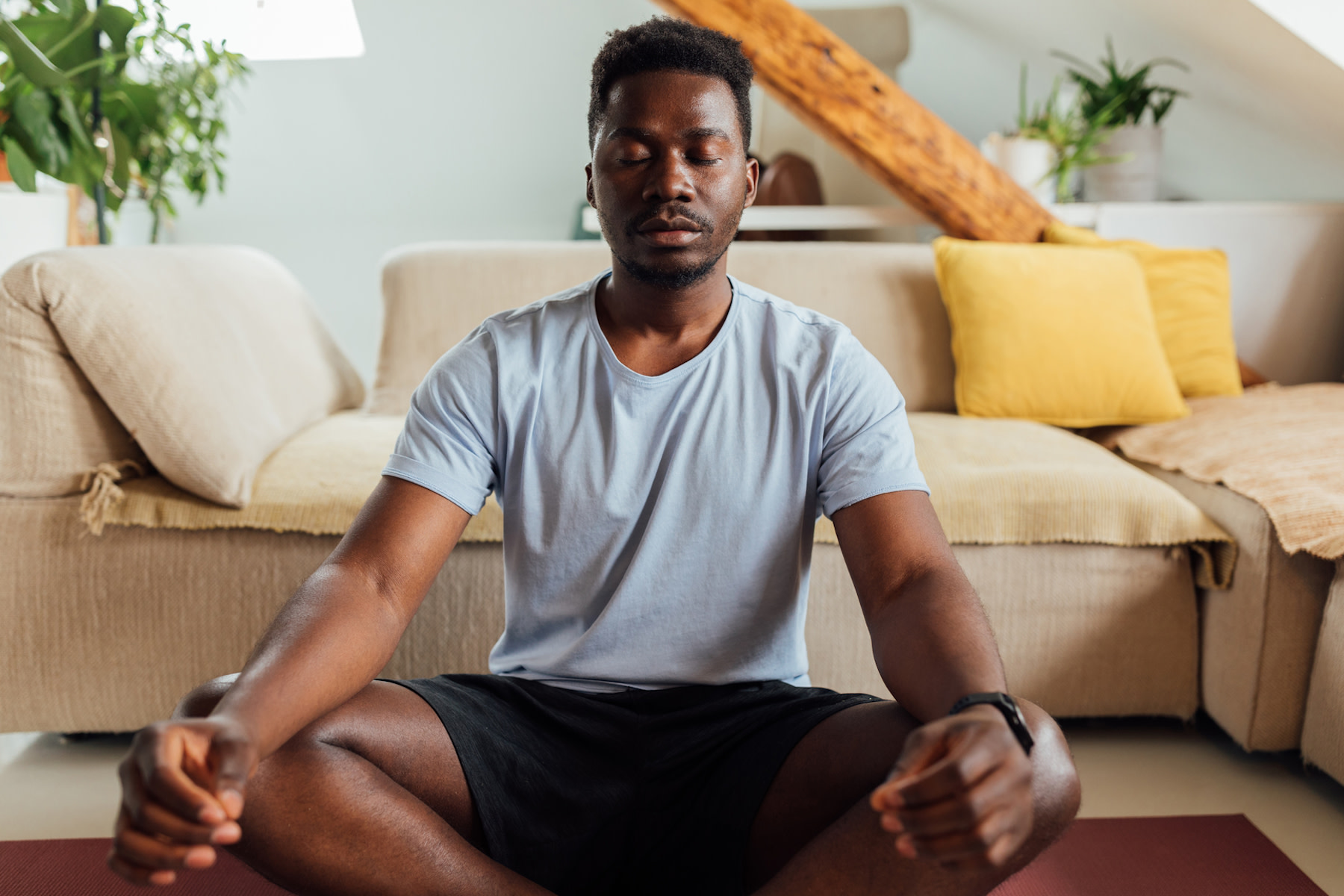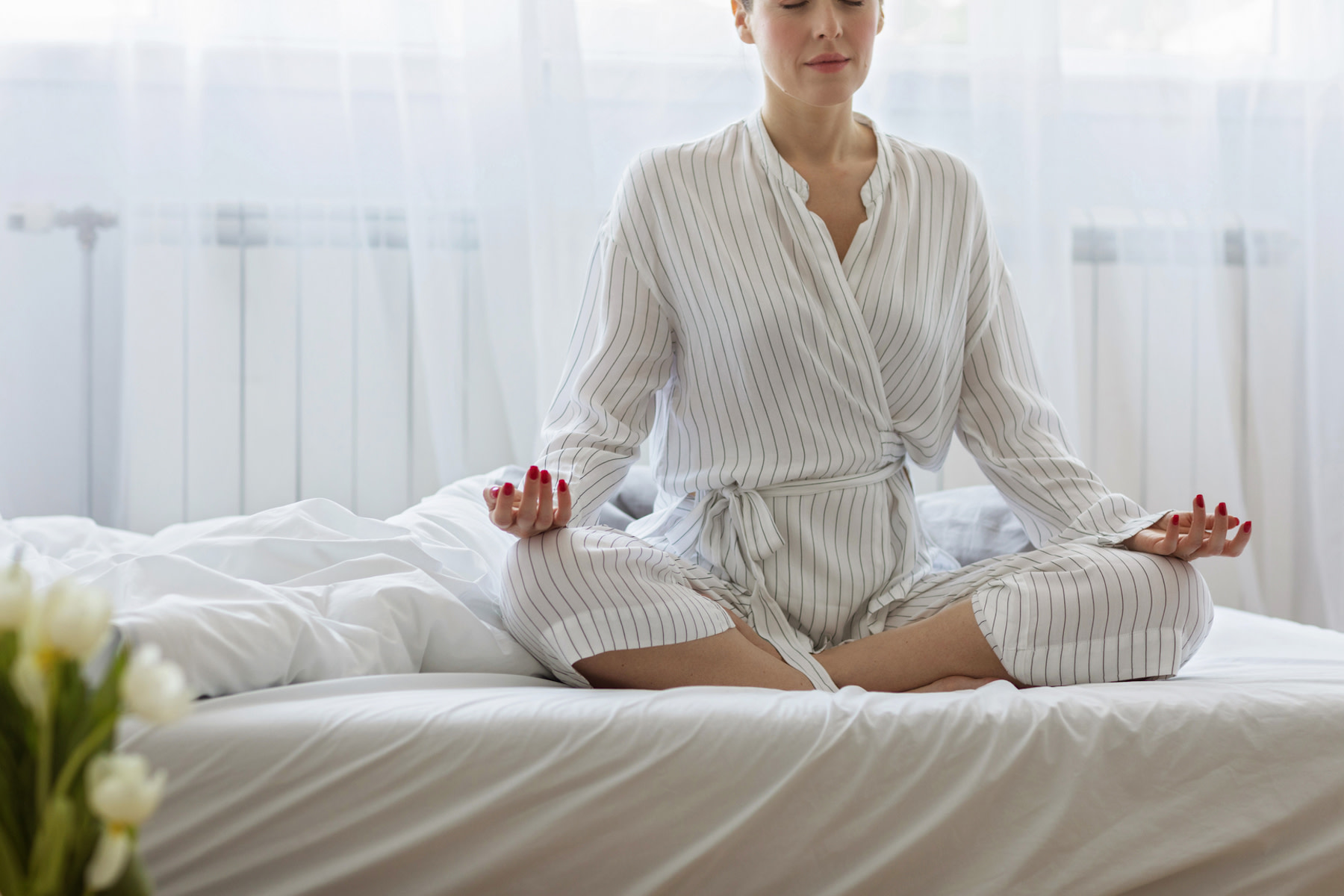
© Brat Co / Stocksy United
Morning Meditation Will Transform How You Start Your Day—Here's How to Do It
Meditating for a few minutes before your day begins can be seriously powerful.
By Jessica Migala•
Benefits of Morning Meditation
How to Meditate in the Morning
How Long Should You Meditate in the Morning?
How to Make Morning Meditation a Habit
The Takeaway
When you wake up, you might feel tempted to hit the snooze button or scroll through your notifications—but getting up and doing a morning meditation may be a more powerful start to your day.
“Making the time to meditate daily actually makes space for more time in our lives because it is a practice of being aware and present,” says Peloton instructor Chelsea Jackson Roberts. “I am absolutely more mindful of my time and time management when I integrate meditation daily.”
While meditation is beneficial at any time of day, a morning meditation may be especially impactful, as it sets up your day with clarity, focus, and intention. Keep reading to explore the benefits of morning meditation, how to get started, and how to make the practice a habit.
Benefits of Morning Meditation
Here's how many of our days start: your alarm blares, you roll over, and you check the news, social media, or your email (or perhaps all three). By the time you roll out of bed, you're in a state of alert and stress, rather than tranquility and ease.
This is why morning meditation can be so important—and so transformative to how you start your day. Here are some of the biggest benefits of morning meditation:
1. It Provides a Fresh Start
Meditation in the morning can center you and help you shake off anything that happened yesterday that you’re carrying into today. “I love meditating in the morning because I feel like I am waking up to a fresh and new slate,” Chelsea says. “It’s my chance to meet the day and try again.” She likens meditation to a “work in,” meaning that it builds your mental and emotional muscles. “Sometimes a ‘work in’ is just as important as a ‘workout,’” she says.
2. It Improves Your Mood
There’s solid research behind the power of meditation, and specifically, morning meditation. In general, meditation has been shown to improve stress and well-being, reduce symptoms of depression and anxiety, boost life satisfaction and quality of life, and decrease burnout, according to a 2021 meta-analysis published in the Journal of Affective Disorders. That can make a difference in your life at any time, but how wonderful would it feel to approach your day with a more even-keeled, less stressed mood?
3. It Makes It Easier to Establish a Meditation Habit
Meditation in the morning may be especially impactful because the timing makes it easier to stick with, suggests a 2023 study published in the Journal of Medical Internet Research. The research found that those who were creating a new meditation habit using an app were more likely to do it regularly and less likely to give it up entirely if they did it in the morning compared to late at night. The study points out that for many people—especially those who see themselves as early birds—the circadian rhythm is primed for establishing new habits after waking up. This is when levels of cortisol (a hormone produced by your adrenal glands) are at their highest, which has been found to have a role in habit formation.
4. It Hones Your Attention and Focus
The cognitive boost you get from meditation can be especially useful when you’re just starting your day. You need the brainpower and resilience to get through everything on your to-do list, and meditation may help you get there. A 2021 Mindfulness meta-analysis suggests that meditation improves attention, executive control, inhibition, and performance on accuracy-based tasks. (Yes, yes, yes, yes please!)

© Lumina / Stocksy United
How to Meditate in the Morning
Establishing a morning meditation practice might feel intimidating at first, but there’s no need to make it complicated. All you really need is a space to meditate, a willingness to try it, and a few minutes in your morning routine.
Here are some pro tips for getting started with morning meditation:
Choose a quiet space. “The fewer distractions, the better,” Chelsea says.
Find comfort. Ideally, look for a seat that’s comfortable and supportive for your body, Chelsea says. This can be on the floor (with or without a cushion) or in a chair. Even your bed could work!
Place your hands where they feel right. You have multiple options when it comes to your hand placement, Chelsea says. Placing them on your lap or knees will help anchor you, she explains, but you could also place them gently on your chest or belly to stay connected with the rise and fall of your breath.
Quiet your mind. This can be easier said than done—you may already be thinking about your to-do list, a call you’re dreading, or the deadline you have to meet. "What business do I have to sit still right now?!" you might think. But remind yourself that the practice is worth it and that you deserve time for yourself, even if you can only spare a few minutes. Then simply focus on your inhale and exhale, Chelsea says. When you find your mind wanders to that to-do list, gently guide it back to your breath. And no judgment, either—no one has to get meditation “perfect.” With repetition, this is a practice that can feel easier over time.
Use some guidance. You don’t have to do morning meditations alone. The Peloton App offers a host of guided meditation classes in a variety of durations and types (including picks designed especially for the AM).

Peloton App
Access thousands of classes with no equipment needed.
How Long Should You Meditate in the Morning?
Meditations can be as long or as short as you’d like, and that’s no different when you meditate in the morning. However, if you’re new to meditation or this is the first time you’re slotting it into your morning routine, planning a long meditation can be counterproductive. Start in shorter increments, Chelsea suggests. “Try a five-minute meditation daily for a week and then increase your time,” she advises.
How to Make Morning Meditation a Habit
Starting a meditation habit can be challenging at first, and if you wake up with a busy day ahead, you might feel the urge to say you’ll do it later or skip it altogether. But meditation is best when practiced with consistency (though any time you can dedicate to it is beneficial).
Here are a few of Chelsea’s tips on how to make morning meditation happen:
Put it on your calendar. Schedule morning meditation into your AM routine, adjusting the exact timing to work for you. It might be the very first thing you do after waking up, or perhaps you practice while your coffee brews—but consciously planning when you’ll meditate can help make it stick.
Make a meditation nook. “Set up space in your home for meditation that’s ready to go,” Chelsea says. Going to your space will signal to your brain that it’s time for meditation.
Give yourself grace. Miss a day? Totally forgot? That’s OK! Meditation is a practice that’s meant to improve your life, not make you feel guilt or shame if you didn’t check it off that day. “Remember tomorrow is a new day,” Chelsea says.
The Takeaway
Meditation can benefit you no matter what time of day you practice. However, morning meditation offers a chance to reset from the day before, prepare for the day ahead, and hone your focus to tackle tasks from a more centered POV. What’s more, you may find that it’s easier to establish a consistent meditation practice if you do it in the morning before your day gets started.
This content is for informational and educational purposes only and does not constitute individualized advice. It is not intended to replace professional medical evaluation, diagnosis, or treatment. Seek the advice of your physician for questions you may have regarding your health or a medical condition. If you are having a medical emergency, call your physician or 911 immediately.
This content is for informational and educational purposes only and does not constitute individualized advice. It is not intended to replace professional medical evaluation, diagnosis, or treatment. Seek the advice of your physician for questions you may have regarding your health or a medical condition. If you are having a medical emergency, call your physician or 911 immediately.
Level up your inbox.
Subscribe for a weekly dose of fitness, plus the latest promos, launches, and events.
By providing your email address, you agree to receive marketing communications from Peloton.
For more about how we use your information, see our Privacy Policy.


